From trauma to turnout: Inside David Hogg’s $8M bid to elect young progressives
Mark Keierleber | September 11, 2024
Your donation will help us produce journalism like this. Please give today.

Eamonn Fitzmaurice/LA School Report/Getty Images
This story was published in partnership with The Trace, a nonprofit newsroom dedicated to reporting on gun violence. You can sign up for its newsletters here.
In a video posted to YouTube, 24-year-old school shooting survivor David Hogg points to a whiteboard and outlines a five-step plan to reshape America.
Ever since Hogg survived the 2018 Valentine’s Day shooting at his Parkland, Florida, high school, which killed 17 of his classmates and educators, he’s become a national leader in the push for gun control and a formidable up-and-comer in Democratic politics. His latest effort is Leaders We Deserve, a political action committee formed in 2023 that has raised nearly $8.5 million in the past year to elect Gen Z and millennial progressives to state and national office.
The PAC aims to find young Democrats running for office, flood their campaigns with cash, offer strategic advice, provide a team of volunteers and work with the candidates to build a winning platform.
The strategy, Hogg explains in the YouTube advertisement designed to attract donors, has already met with success in Texas: “We just did this, electing the youngest person to the Texas state Senate, Molly Cook,” the state’s first openly LGBTQ+ senator. Leading up to the May election, Hogg’s PAC bolstered Cook’s campaign with $300,000 in financial backing, money used to blanket her district with mailings and digital ads.
“With Molly, we found in our poll that she was behind by 2%, so we came in and we found that she was ahead by 5 after we informed voters about her background,” Hogg says, adding that his team knocked on the doors of more than 1,000 potential voters. “We got her on MSNBC as well and worked with her on her messaging and the result is that she ended up winning by 62 votes.”
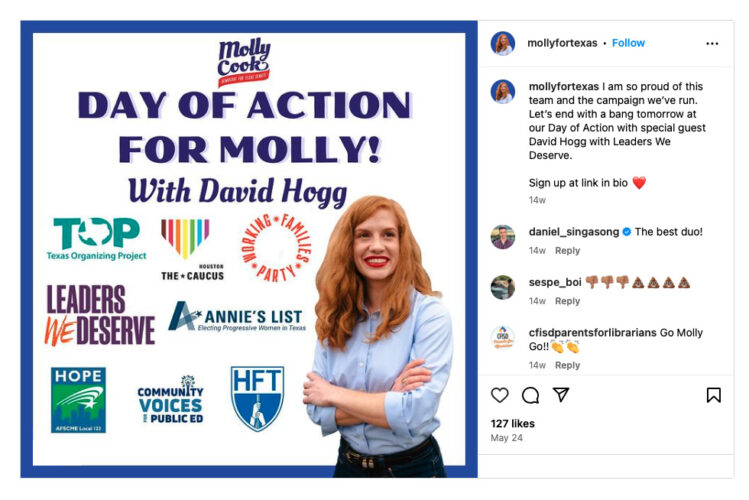
As Hogg works to “elect a ton more Mollys around the country,” an analysis by The 74 of Federal Election Commission filings and the PAC’s digital ads offers insight into how he has leveraged the trauma and lessons learned from surviving one of America’s deadliest school shootings to build out a well-connected, generously funded operation to influence elections.
The urgency of his key issue remains unabated: Two students and two teachers were killed and at least nine others injured Wednesday in a shooting at a Georgia high school. During a presidential campaign stop Wednesday afternoon in New Hampshire, Vice President Kamala Harris called the shooting outside Atlanta “a senseless tragedy, on top of so many senseless tragedies.”
“It’s just outrageous that everyday in our country — in the United States of America — that parents have to send their children to school worried about whether or not their child will come home alive. It’s senseless,” Harris said. “We’ve got to stop it.”
Leaders We Deserve has pumped millions of dollars — and resources from Democratic power players — into the campaigns of young candidates who support progressive causes like gun control, reproductive rights and protecting public school funding. Its efforts going into November will almost certainly be strengthened by Harris’s presence atop the ticket, an event that has energized young voters.
Joining forces with Hogg, a recent Harvard graduate, is Kevin Lata, the former campaign manager of U.S. Rep. Maxwell Frost, a Democrat from Florida who, at 27, is the first member of Gen Z to serve in Congress. Hogg and Lata didn’t respond to interview requests.
“As a generation, we’ve collectively been told to run, hide and fight over and over during active shooting drills, and our generation has learned that along with our ABCs,” Hogg says in one ad. “I think it’s time that we repurpose the meaning of that. We need to start running for office. We need to stop hiding from the responsibility that we have to protect future generations.”
Sign-up for the School (in)Security newsletter.
Get the most critical news and information about students’ rights, safety and well-being delivered straight to your inbox.
Cook has received the largest share of direct campaign cash from Leaders We Deserve, according to the PAC’s most recent federal financial disclosures, which cover the period from June 2023 to the end of July 2024. In that time, the group has helped finance the campaigns of 16 candidates, primarily at the state level, including in Pennsylvania, Alabama, Florida and Ohio.
Funding has gone to the Georgia House race of a seventh-grade math teacher in Atlanta, a former Miss Texas vying for a state House seat on a gun control platform, a 28-year-old in Pennsylvania whose run for the state House is centered on combating school budget cuts, and a 28-year-old mother running for a House seat in Tennessee after the state denied her access to an abortion.
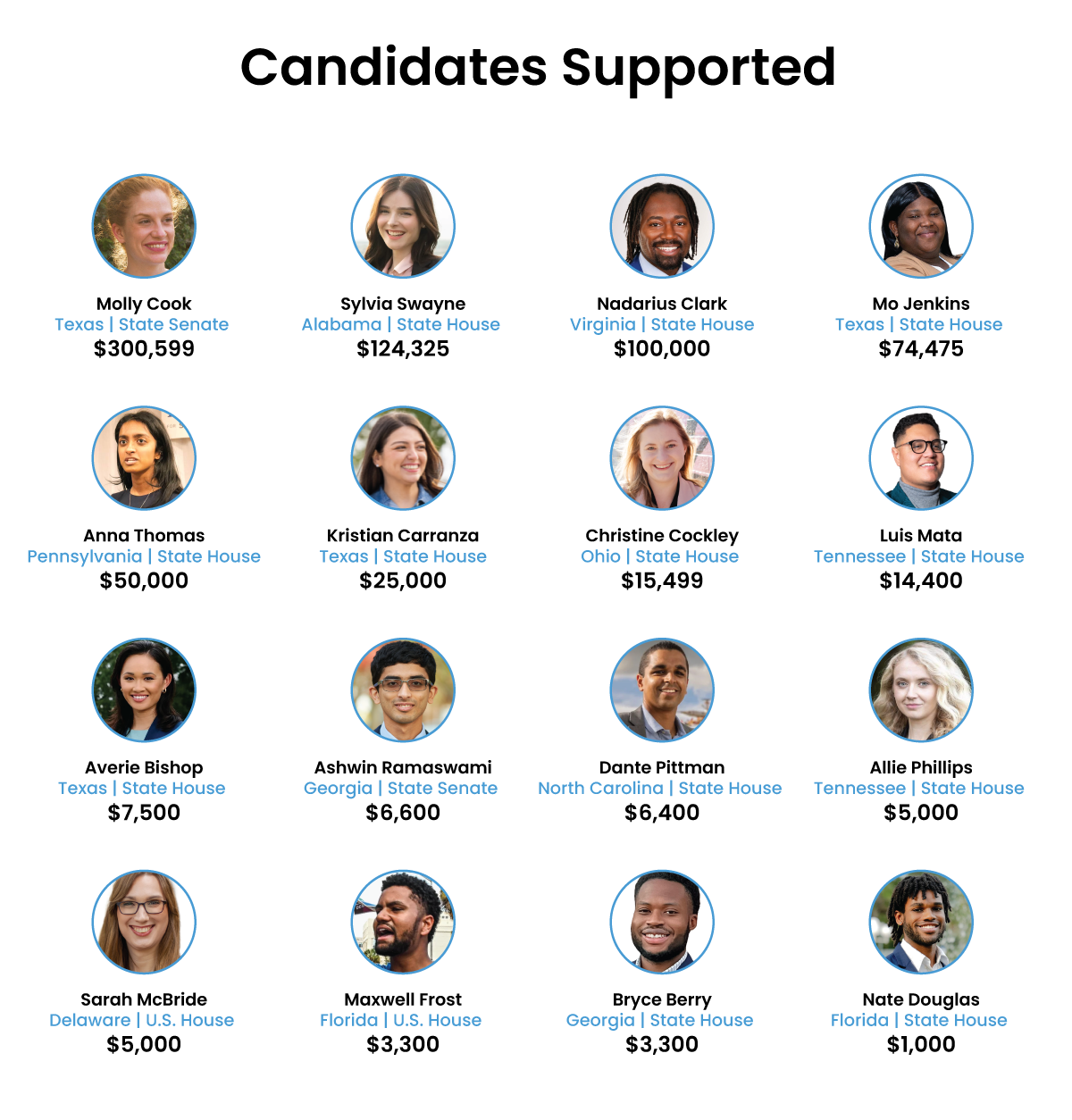
‘Pain into purpose’
Though young candidates are underrepresented in public office across the country, and they tend to face steeper financial barriers than those from older generations, FEC data — and Hogg’s five-step plan — show the PAC offers more than money to its endorsed candidates. It has ties to some of the major players in Democratic campaign operations.
Its 59-person advisory board encompasses education leaders, gun control proponents, youth activists and two former law enforcement officers — Harry Dunn and Michael Fanone — who defended the U.S. Capitol during the January 6, 2021, attack by a mob of Donald Trump supporters. Democratic politicians, half of them 35 or younger, make up the largest share of advisors.
Among the more seasoned advisors is Arne Duncan, the former education secretary for President Barack Obama. Duncan now has his own group — Chicago CRED — which provides job training and other resources in a bid to stem gun violence in his hometown.
Duncan told The 74 that he and Hogg communicate regularly to discuss their shared goal of thwarting gun violence. Duncan said that his “generation has failed” to confront the issue in a meaningful way, leaving young people — including the ones Hogg is working to elect — to devise solutions.
“I hate the leadership that David has had to provide on this issue. I hate the trauma that he and his classmates and his school and his community have been through,” Duncan said. “But I so appreciate him turning that pain into purpose and really fighting to change things.”
Hogg— who co-founded the gun control group March for Our Lives in the Parkland shooting’s immediate aftermath and has campaigned in previous elections for candidates who support new gun laws— has garnered financial support for his political committee from marquee donors. The bulk of donations — more than $4.3 million — come from undisclosed individuals contributing less than $200, but the largest single contribution of $300,000 is from Ron Conway. The Silicon Valley venture capitalist and gun control proponent served on the advisory board of Sandy Hook Promise, which has sought to reduce campus gun violence in the wake of the 2012 mass shooting at the Newtown, Connecticut, elementary school.
Other prominent donors include reproductive rights activist Phoebe Gates, the daughter of Microsoft founder and philanthropist Bill Gates, who gave $75,000, and actress Kate Capshaw and her husband, the director Steven Spielberg, who donated a combined $25,000.
That support, federal election data shows, has translated into significant spending, with nearly $3 million going to advertising via text messaging, digital ads and campaign mailers. Nearly $1 million — the PAC’s second-largest expense — was used to purchase lists with the contact information of potential voters.
The PAC’s expenditures also reflect the web of influential players working behind the scenes. Leaders We Deserve paid nearly $130,000 in legal fees to the Elias Law Group, the firm of Democratic election lawyer Marc Elias, who helped Harris vet vice presidential candidates and is now assisting with the party’s vote recount strategy for November. Other top payments were to prominent political fundraisers and strategists, including The Hooligans Agency, a firm credited with using Hollywood tactics to make viral political ads.
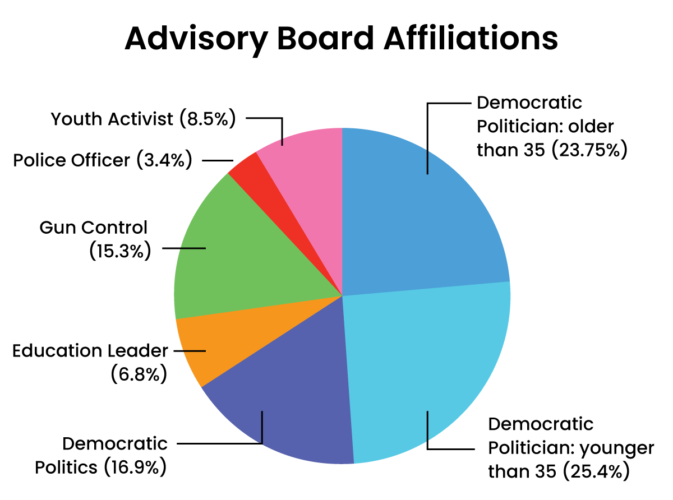
PACs like Leaders We Deserve have faced criticism for injecting smaller races with big money from interest groups and out-of-state donors. Leaders We Deserve has found its greatest success raising money from donors in California, Maryland, Massachusetts and New York, federal data shows. The group hasn’t contributed to candidates in any of those states.
Randi Weingarten, the president of the American Federation of Teachers and a Leaders We Deserve advisory board member, said the PAC offers Hogg a strategic advantage.
“He did this in a way so that he wasn’t constrained by party,” Weingarten said. “He understands and knits together policy and politics.”
‘A big barrier’
Even with its list of established connections, Leaders We Deserve faces headwinds in driving change.
Young people are “vastly underrepresented on the ballot” and run for public office at much lower rates than older adults, according to a 2022 white paper from the Center for Information & Research on Civic Learning Engagement, or CIRCLE, a nonpartisan youth-focused research organization at Tufts University.
As of 2021, millennials — those born between 1981 and 1996 — made up a quarter of the voting population yet represented just 7% of lawmakers in Congress. Researchers found that financial insecurity and structural inequities — not apathy — were behind the divide.
While more than 20% of young adults 18 to 25 said they would consider seeking public office — and an increasing number of them have followed through in the past decade — the encouragement they receive varies widely by race and gender. Younger candidates are more diverse than those from older generations, but while Black and Latino youth are more likely than their white counterparts to consider an election bid, they are less likely to actually run.
The data drives home why groups like Leaders We Deserve are critical to improving civic engagement among young people, said Sara Suzuki, a senior researcher at CIRCLE.
“That gap between interest and actually running can be filled by organizations like Leaders We Deserve and other organizations across the spectrum because financial support is a big barrier,” Suzuki said, adding that the PAC’s explicit encouragement of young candidates could lead more of them to enter politics.
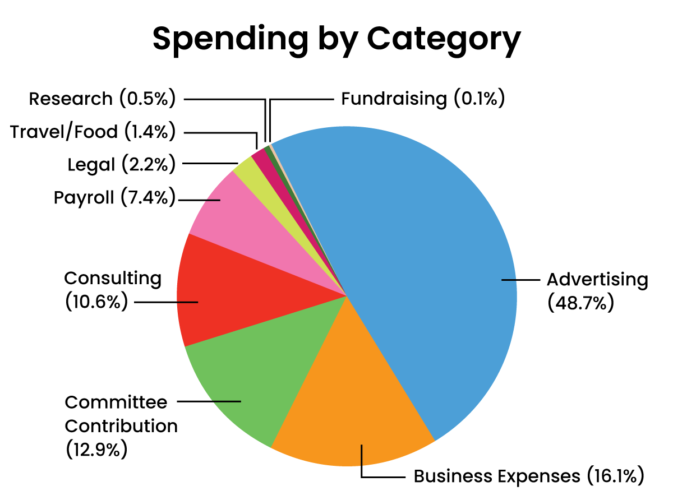
Advertising, including mailings and digital ads, is the top expenditure for Leaders We Deserve as the group seeks to bolster support for young progressives. (Graphic by Eamonn Fitzmaurice of The 74/Federal Election Commission)
Getting the necessary votes is another story. Suzuki said it’s plausible that a candidate’s age is one of the factors that young people consider at the ballot box, but that they are primarily driven by specific issues rather than individual candidates or parties.
“They really vote as a way to make change happen on issues that they care about,” she said, “and those issues tend to be economic issues like cost of living, climate change is a big youth issue, gun violence and abortion.”
‘Leaders for 2050’
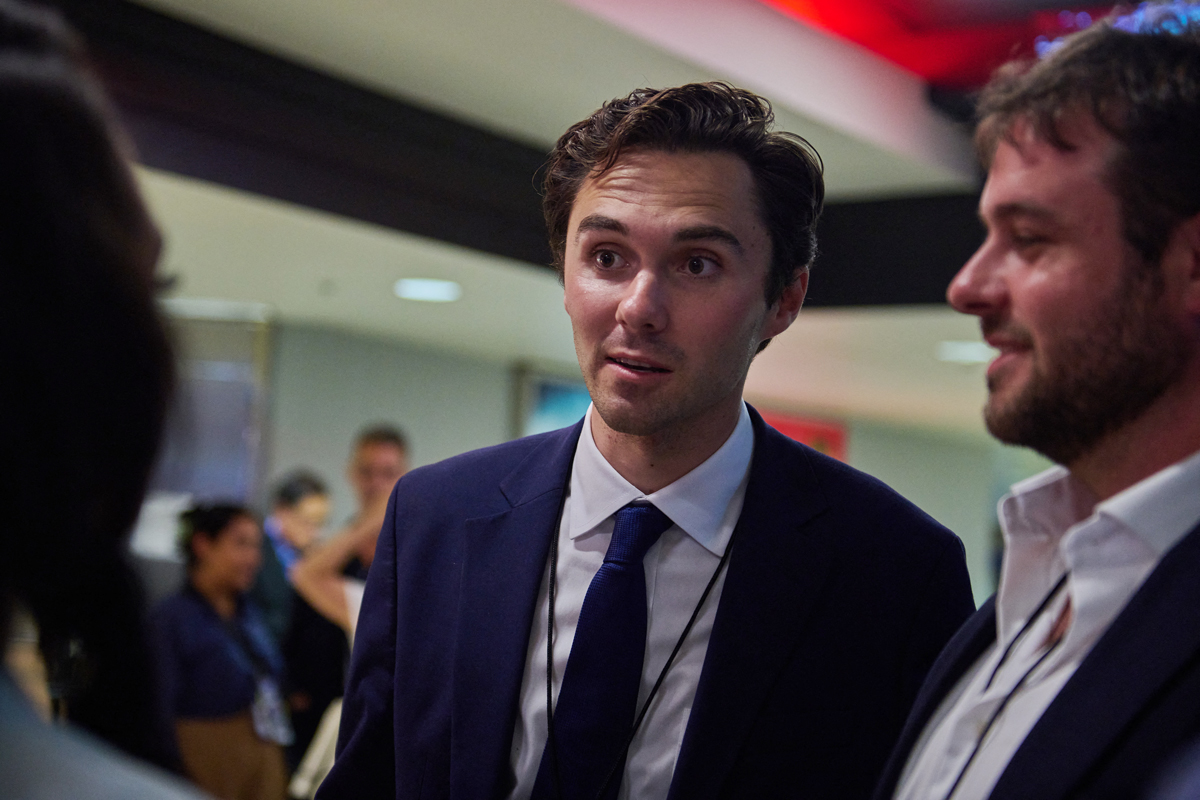 School shooting survivor David Hogg, who launched Leaders We Deserve to elect young progressives to public office, attends the Democratic National Convention in August in Chicago. (Getty)
School shooting survivor David Hogg, who launched Leaders We Deserve to elect young progressives to public office, attends the Democratic National Convention in August in Chicago. (Getty)The PAC’s first endorsement went to the congressional campaign of Sarah McBride, a Democratic state senator in Delaware since 2021 who has been credited for helping shape President Biden’s views on transgender rights. If elected, the 34-year-old would be the first openly transgender member of Congress.
“Everyone deserves to feel safe in their community, whether you are walking alone at night or going to school during the day,” McBride notes on her campaign website. “The truth is, when it comes to guns, our country has lost its common sense.”
The PAC’s “first elected candidate,” according to Hogg, was Nadarius Clark, the youngest member of the Virginia House of Delegates. Clark got $100,000 in support and beat his Republican opponent by 800 votes in 2023. Leaders We Deserve and the ideologically aligned nonprofit Everytown for Gun Safety were Clark’s top campaign contributors, state records show.
The PAC stands to see another victory this fall in Georgia, where Bryce Berry — the 22-year-old Atlanta middle school math teacher — faces an incumbent who switched from Democrat to Republican last year in order to support private school vouchers. The heavily Democratic district has never elected a Republican to the state House.
Leaders We Deserve has also been handed defeats, including its failure last fall to help elect a 26-year-old transgender woman to the Alabama House of Representatives. The PAC spent $124,325 on the race, one that Hogg acknowledged would be tough.

But the group is looking well beyond 2024’s high-stakes election cycle, a strategy that Duncan, the former education secretary, said is critical to the Democratic Party’s future. The state lawmakers elected today, he said, are one step closer to becoming the national leaders of tomorrow.
“That’s what David’s play is about,” Duncan said. “It’s not about, ‘We’re going to change the entire world tomorrow,’ but it’s, ‘Can we plant a whole bunch of amazing seeds, nurture them, develop them, support them and see what happens.’”
It’s a political mindset that the group hopes will propel progressive leaders beyond their Republican rivals.
“While MAGA plans for 2025,” one of the PACs ads states in reference to Trump’s ties to the ultra-conservative playbook to remake the federal government, “we’re building leaders for 2050.”
This article was published in partnership with The 74. Sign up for The 74’s newsletter here.